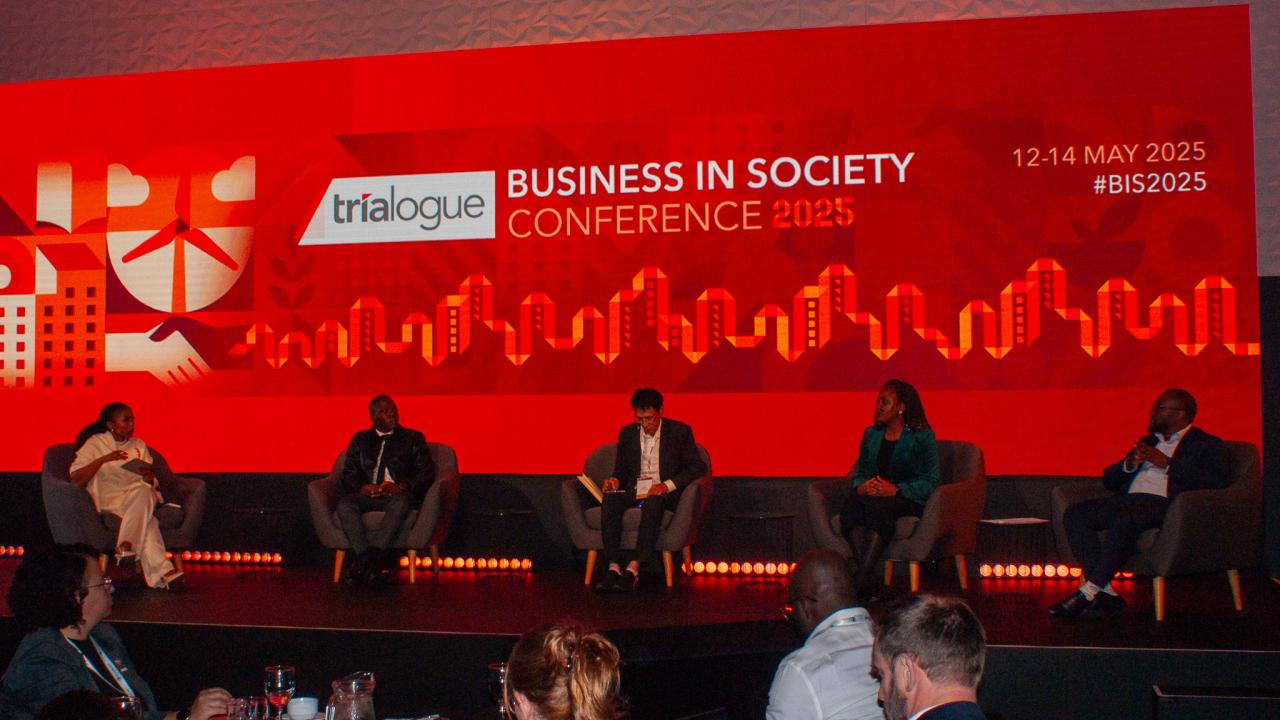
A panel discussion taking place amongst numerous representatives.
As global attention shifts and social and environmental priorities face new pressure, the 2025 Trialogue Business in Society Conference brought together leaders from businesses, government and the non-profit sector to explore how South African organisations can stay committed to development goals. The two-day hybrid event focused on the need for deeper collaboration and adaptive strategies to continue delivering meaningful social impact despite a turbulent political and economic climate.
This year’s conference attracted broad support, with FirstRand Foundation, Absa, MTN, Sanlam, Telkom and the Vodacom Foundation participating as headline content sponsors. Volkswagen Group Africa returned as the gift sponsor and Wesgro supported networking efforts at the event.
Under the theme Driving Impact and Inspiring Change, the conference opened with a panel discussion on cross-sector collaboration. Presented with Sanlam, this session looked at the importance of breaking down silos between business, government and civil society to increase the reach and effectiveness of social investment efforts. A conversation hosted by FirstRand Foundation followed, with a focus on strengthening early childhood development (ECD). Speakers highlighted how more deliberate investment in ECD could overcome systemic barriers and expand access to quality early learning for children across the country.
Later Absa partnered with Trialogue for a discussion about building sustainable youth entrepreneurship. The panel explored how to move from policy to implementation, identifying the challenges and opportunities in establishing effective ecosystems that support young entrepreneurs. MTN led the closing session of the day, with speakers examining the role of digital skills development in preparing youth for economic participation in a fast-changing digital world.
Day two continued the focus on impact and scale. Vodacom Foundation supported a session that explored the importance of embedding a culture of monitoring, evaluation and learning within organisations. The session outlined how evidence-driven approaches can help refine social programmes and enhance long-term outcomes. The final panel of the conference, presented with Telkom, turned attention to education and employment. Discussions revolved around practical ways to connect learning with job opportunities, particularly for young people entering the workforce.
Throughout the programme, a shared theme emerged: Social change cannot be driven by any one sector alone. Instead, sustained impact depends on coordination, shared vision and a commitment to learning and adaptation.
Trialogue director Cathy Duff noted the urgency of this approach. “The retreat from sustainability commitments and social development initiatives globally has created a complex landscape for organisations committed to addressing persistent inequalities and social challenges in South Africa,” she said. “This year's conference addresses a critical moment for corporate social responsibility. South African businesses have a unique opportunity to demonstrate leadership by recommitting to sustainable practices and innovative social impact strategies.”
The conference’s keynote speakers reinforced this call for action. Busi Mavuso, Chief Executive Officer of Business Leadership South Africa, opened the event with reflections on the role of corporate South Africa in rebuilding trust and driving change. She underscored the influence that business can wield in shaping a more inclusive economy, particularly when leadership remains consistent in uncertain times.
Minister of Basic Education Siviwe Gwarube delivered the second keynote, focusing on how government and business can collaborate more effectively to strengthen public education. Her address outlined the structural improvements needed within education and pointed to several examples of successful public-private partnerships already underway.
The final keynote came from Dr Naledi Pandor, Chairperson of the Nelson Mandela Foundation. Drawing on her experience in both Parliament and Cabinet, she spoke about the evolving role of business in addressing development challenges. Her remarks called for deeper engagement between companies, civil society and the state, urging the private sector to step into a more active leadership role in driving transformation.
The 2025 Trialogue Business in Society Conference reinforced the critical need for cooperation in delivering real change. At a time when global focus may be drifting, South African organisations are being encouraged to remain steady in their pursuit of inclusive, long-term development.
-ENDS-